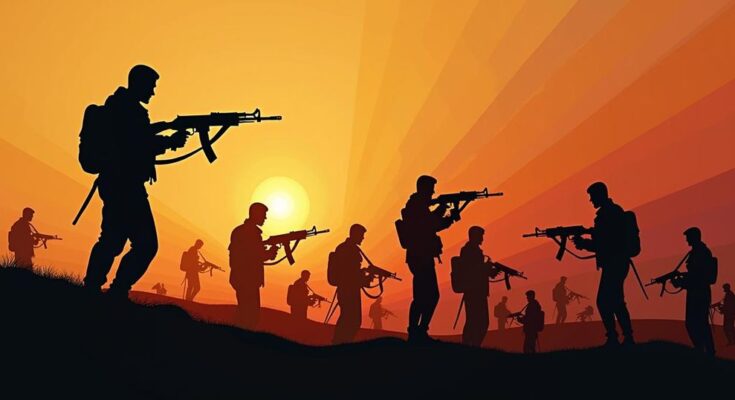The assassination of Hezbollah’s leader, Hassan Nasrallah, by Israel marks a significant escalation in the conflict. Hezbollah aims to retaliate despite severe losses, while Iran may leverage its network of militias to respond. Israel is intent on continuing military operations without pauses, emphasizing its goal to dismantle Hezbollah’s threat. The ensuing actions of these factions will play a pivotal role in regional stability.
The recent assassination of Hassan Nasrallah, the longstanding leader of Hezbollah, marks a significant escalation in the ongoing conflict between Israel and the Lebanese militant group. This development has the potential to ignite a broader regional conflict involving Iran and, potentially, the United States. Looking ahead, the actions of Hezbollah, Iran, and Israel will be critical in shaping the course of events. Hezbollah, having suffered substantial losses including the decimation of its command structure and armaments, is at a crossroads. Despite the setback of losing its leader, which could destabilize its operations, the group has vowed to persist in its fight against Israel. Analysts, such as the U.S.-based Middle East security expert Mohammed Al-Basha, note that “the loss of Hassan Nasrallah will have significant implications, potentially destabilising the group and altering its political and military strategies in the short term.” However, with a motivated cadre of fighters and a stockpile of long-range missiles, there remains internal pressure to execute strikes against Israel—notably before further destruction of its capabilities occurs. Iran’s response is equally paramount. The assassination deeply impacts Iran, as Nasrallah was closely allied with the regime. Iran has proclaimed five days of mourning for Nasrallah and is reportedly taking precautions to secure its leadership. Should Iran decide to retaliate, it possesses several armed militias across the Middle East, known collectively as the “Axis of Resistance,” including the Houthis in Yemen and various factions in Syria and Iraq. While Iran may ramp up attacks against Israel and U.S. interests in the region, any action is expected to be calculated to avoid a full-scale conflict. Israel, for its part, remains resolute in continuing its military operations and has displayed no intention of adhering to the proposed ceasefire. With Hezbollah reportedly weakened, Israel seeks to eliminate the threat posed by the organization. However, achieving this objective without ground troop deployment presents a challenge. The Israeli Defense Forces (IDF) are preparing for potential incursions, a task that would be easier to initiate than to conclude, as indicated by Hezbollah’s extensive preparations over the past years to counter an Israeli ground offensive.
The conflict between Israel and Hezbollah has escalated dramatically, particularly following Israel’s targeted assassination of Hassan Nasrallah. Over time, Hezbollah has established itself as a prominent military force, largely supported by Iranian backing. Nasrallah’s leadership has been a cornerstone of the group’s strategy and operations. Recent events have brought to light the fragility of Hezbollah’s command and structure, with implications extending beyond Lebanon to involve regional actors, particularly Iran, which perceives itself as a protector of allied groups in the region. The situation carries the potential for a wider confrontation, with significant risks for the stability of the entire Middle East.
The trajectory of the conflict following the assassination of Hassan Nasrallah remains uncertain, as respective responses from Hezbollah, Iran, and Israel will shape the future dynamics of the region. Hezbollah’s resilience and retaliatory efforts could escalate tensions, while Iran’s potential mobilization of allied militias will serve as a critical factor to monitor. Concurrently, Israel’s aggressive military strategy indicates a resolve to neutralize Hezbollah’s capabilities at any cost. Deliberate and strategic maneuvering by these entities will be essential to avoid a full-scale war that none may be able to withstand.
Original Source: www.bbc.com




